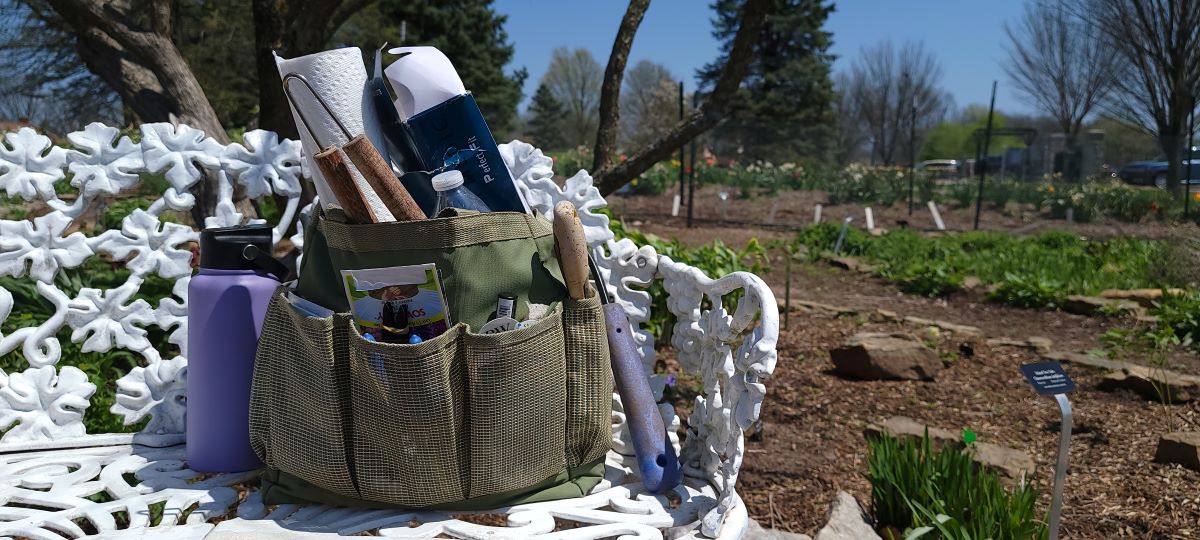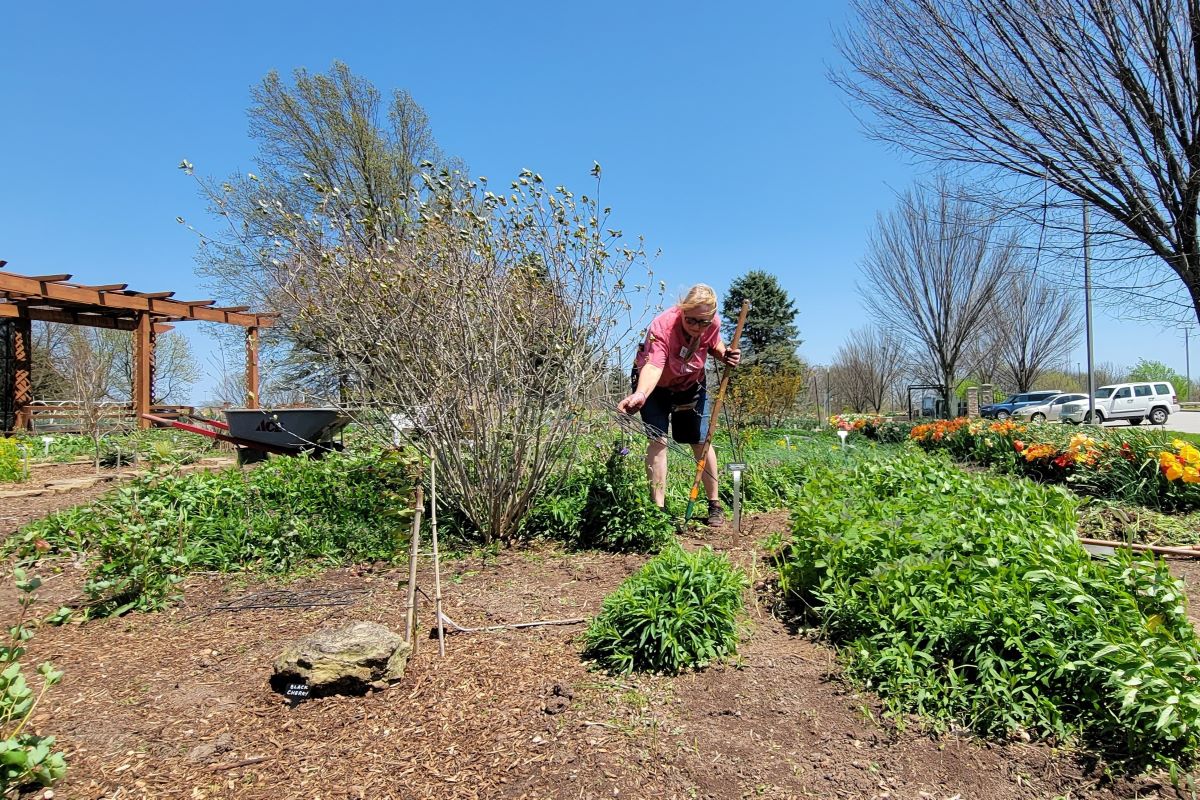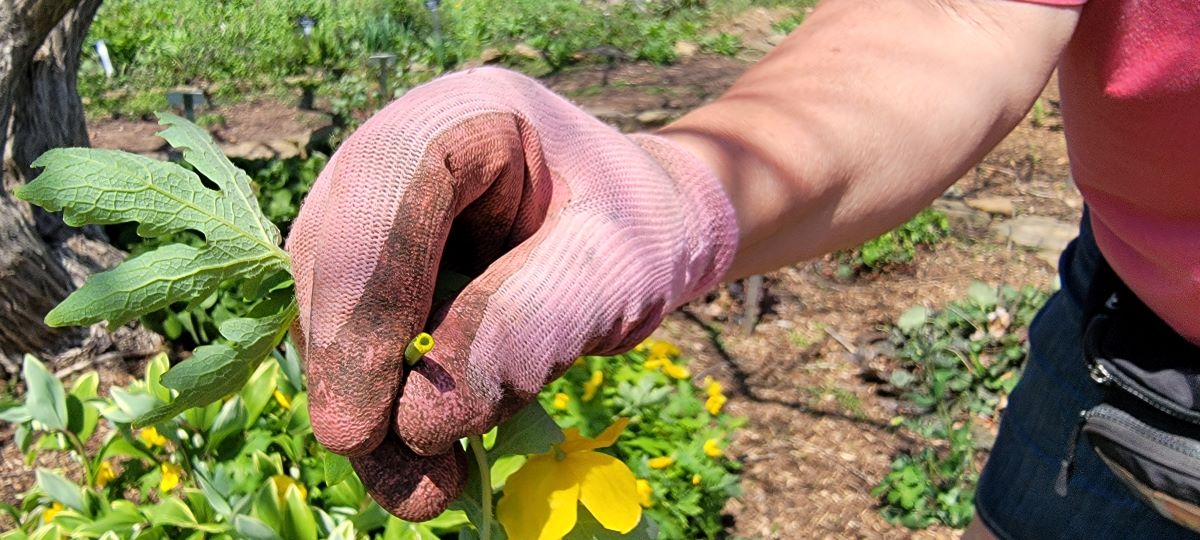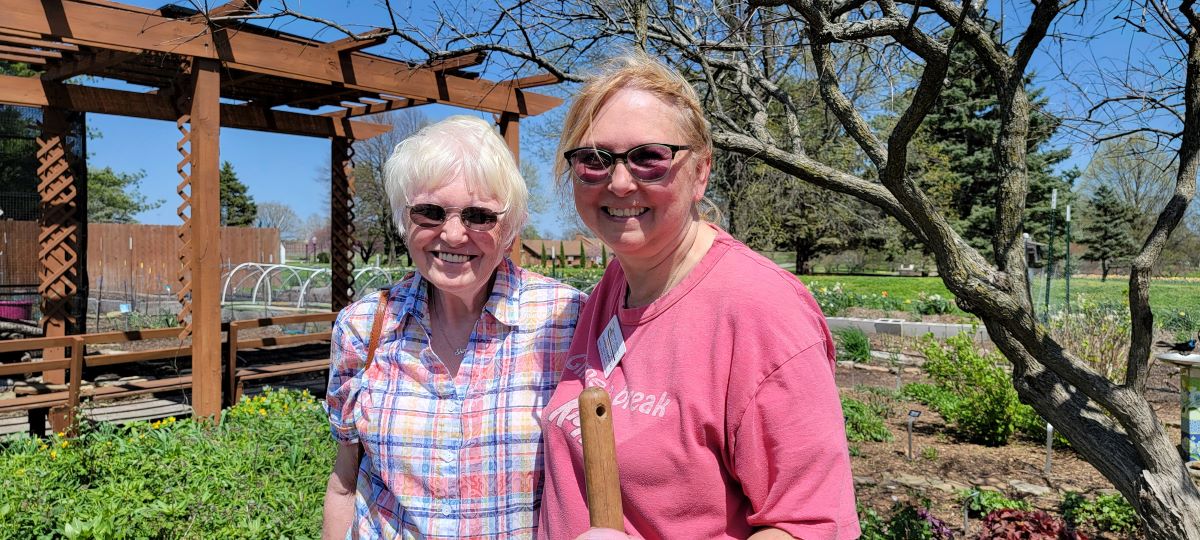Growing up watching her mother and grandmother work in their gardens, Deanna Haworth came by her passion for plants naturally.
The 56-year-old Springfield native had always gardened, too — and couldn’t wait to spend more time digging in the dirt after she retired.
Just like any good gardener preparing soil for planting, in 2018, Haworth prepared to live her dream. Two years before retiring from her nursing career at the U.S. Medical Center for Federal Prisoners, she enrolled in the University of Missouri Extension Master Gardener Program and completed classes and training to become a certified master gardener.
“It’s always been a dream of mine to become a master gardener and work in this garden,” Haworth said while pulling weeds one windy afternoon in April in the Missouri native plants beds of the Master Gardeners Demonstration Garden at Springfield Botanical Gardens at Nathanael Greene/Close Memorial Park. “And here I am.”
Thanks to Haworth and some 250 more master gardeners, Greene County is, well, a lot greener than it might be without their efforts.
Greene County master gardeners maintain two demonstration gardens — one with plots of native plants, culinary herbs, fiber plants and turf grasses at the botanical gardens, and the other with drought-tolerant plants at the WaterWise on South National Avenue between Brookside and Linwood.
With only one full-time gardener in charge of 114 acres of land, the park depends on the volunteer help, according to Kelly McGowan, the University of Missouri Extension field specialist in horticulture who coordinates the program in Greene and Christian counties.
Education is the focus

Pulling weeds is part of what they do — so far, master gardener trainee Jenny Fillmer Edwards quips, “It’s a lot of pulling weeds.”
McGowan says volunteers do much more as they gain experience.
“Sometimes there’s a myth around master gardeners that they’re keeping up flower beds and things like that,” McGowan says. “And that’s just not the case.”
The mission of the master gardener is to educate others, whether they are trying to grow their own plants for the first time, or they are experienced gardeners looking to try something new and different.
Master gardeners speak at churches, schools and civic group meetings, McGowan says, adding, “One of our biggest outreach tools is our gardening hotline.”
According to the Master Gardeners of Greene County website, hotline volunteers answer more than 2,000 gardening questions from the public each year through email, phone calls and in-person visits to the Springfield-Greene County Botanical Center.
Haworth enjoys talking with park visitors who stop by the demonstration garden.
“I get asked a lot of questions about things and get to give advice, especially on the native plants I’m passionate about,” she says.
Lifelong gardener and master gardener emeritus Debi Hunget says teaching others how to grow plants is what she likes best about the program.
“Everybody needs to know how to grow their own food,” says the 62-year-old Springfieldian. “There’s nothing better than fresh.”
Hunget says one of her favorite volunteer activities is teaching children in the Young Sprouts in the Garden event held during the park’s annual Butterfly Festival.
“It’s fun when you give kids a bean and they put it in soil,” she says.
Becoming a master gardener
While passing on gardening knowhow has been an important part of what master gardeners do since the statewide program was established in 1983, trainees must first gain knowledge by completing core classes on more than a dozen topics, from plants and their environments to safe pesticide use.
Edwards, whose husband, Matt Edwards, enrolled her in MU Extension’s online master gardening class as a Christmas gift at the height of the COVID-19 pandemic, says she learned “more than I ever expected to know about turf maintenance — different types of grass and what to plant where.”
Edwards, who works as the Springfield-Greene County Park Board public information administrator, adds that she “survived the chapter on insects.”
“As an aspiring master gardener, you think it’s all going to be flowers and vegetables, and it’s not,” says Edwards, who has been growing vegetables since she was in college.
Vegetable gardening and herbaceous ornamentals are among the topics covered in coursework that typically takes eight weeks of weekly or twice-weekly meetings to cover, McGowan says.

To become certified, trainees must also complete 30 hours of volunteer work during their first year of service; after the first year, they must complete 20 hours of work a year, plus six hours of continuing education in order to maintain master gardener status.
The next master gardener training class in Greene County will begin in June or July, depending on how quickly the spaces fill.
After earning certification, members can go on to earn the titles of advanced and emeritus gardeners by completing research-based training beyond core classes or serving 10 years or more, respectively.
“We really put a value on education and want our master gardener members to keep learning,” McGowan says.
Interest in the program has remained steady over the more than eight years she has coordinated it, McGowan says.
“I try to have a training class every year, and I’ve never had a problem filling it,” McGowan says.

Perennial impacts
That education can benefit master gardeners’ own gardens, too, no matter whether they continue to volunteer with the program after becoming certified.
Edwards, for example, says learning how to properly prune a tree or bush inspired her to take on the ones in her own yard.
“I pruned all of them after that,” Edwards says.
Fascinated by the role of bees and other pollinators in sustainable gardening, Haworth has replaced the grass in her yard with clover.
“It’s maybe a small way of doing my part, and it helps the bees,” she says. “Clover’s so nice to walk in, too.”
And Haworth is sustaining not only the pollinators, but her family’s rich gardening legacy. As Haworth works, her mother, Shirley Hall, stops by to admire her progress at the native plants plot.
Hall, 76, says she’s proud of her daughter’s work as a master gardener.
“She’s doing something I would’ve loved to have done myself,” Hall says.
More on the University of Missouri Extension master gardeners
- To find out more about the master gardeners program or sign up for the next training class set to begin in June or July, call or email Kelly McGowan at (417) 874-2955 or mcgowank@missouri.edu. Cost is $200 per person.
- A fundraiser to benefit programs, the Master Gardeners of Greene County Annual Plant Sale begins Saturday, April 30, at 8 a.m. at the Mizumoto Japanese Stroll Garden Pavilion at 2400 S. Scenic Ave.



